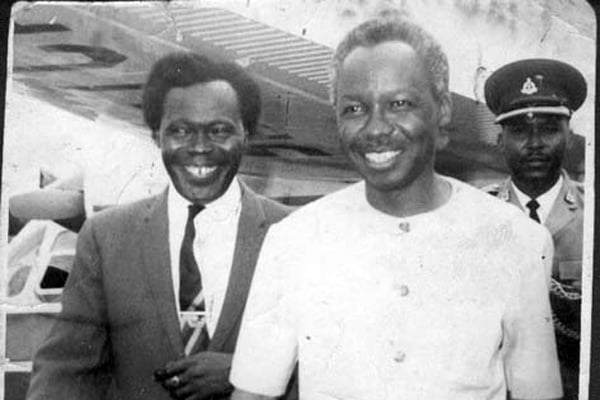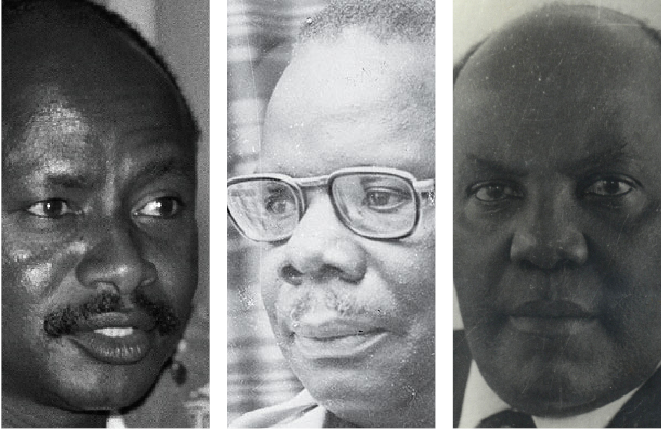Prime
Milton Obote returns after nine-year exile in Tanzania

Former president Milton Obote (left) with his Tanzanian counterpart Julius Nyerere. PHOTO/ FILE
What you need to know:
- May 27 was throughout the Obote II regime commemorated as “Heroes Day”. Supporters of UPC would every May 27 make pilgrimages to Ishaka.
Forty three years ago yesterday, former president Apollo Milton Obote returned to Uganda, which marked the end of his nine-year exile in Tanzania.
The Washington Post of May 28, 1980, reported that the man who had been staying in exile in Tanzania following his ouster by his former army commander, Gen Idi Amin, returned to Uganda aboard a Tanzanian military plane.
“With tears in his eyes, the former president kissed the soil as he stepped down from a Tanzanian military plane in the southwestern town of Bushenyi,” The Washington Post noted.
It was, however, not clear whether it was actually the very first time that Obote had returned to Uganda since April 11, 1980, when the combined force of men and officers of the Tanzania People’s Defence Forces (TPDF) and Ugandan fighting forces – comprised of mostly the Kikoosi Maalum of Gen Tito Okello Lutwa and David Oyite-Ojok, and the Front For National Salvation (Fronasa) of Yoweri Museveni – drove Idi Amin and his Uganda Army (UA) out of Kampala.
The Washington Post indicated that it was at least the third time that he had journeyed into Uganda.
“Although the event was billed as Obote’s first return from his nine-year exile, it has been learned that, with the consent of the Tanzanian government, he made at least three clandestine trips to Uganda to consult with government officials in the months since Tanzanian-backed rebels ousted Amin in April 1979”, the newspaper reported.
Conflicting signals
Before his return to Uganda, Obote had unruffled a few feathers in Kampala when he announced that he would be returning to Uganda to lead his UPC into the next general election.
That announcement unsettled then president Godfrey Binaisa and members of the interim Parliament, the National Consultative Council (NCC), who had moved to block his return and the possible return to multiparty politics.
Binaisa had introduced the politics of “ekigaali” or “umbrella” through which he sought to bring all Ugandans under the same political thoughts and ideas. He advocated holding the 1980 elections on candidates’ “individual merit”.
The NCC had endorsed his idea and announced that the elections would be fought under the umbrella of the Uganda National Liberation Front (UNLF) and not political parties, but the former president insisted that he did not want to be part of the UNLF.
However, in a subsequent interview in Dar es Salaam, Tanzania, Obote insisted that he was returning to Uganda like any other citizen.
READ: From the grace of State House Entebbe to exile in Lusaka: Revealing Dr Milton Obote’s 20 quiet years
“I’m not going back as a candidate. I have no office to regain. But I’m a Ugandan. Uganda is now liberated; I must go home,” he said.
He also alluded to the need for himself and the Uganda Peoples Congress (UPC) party to assess its strength ahead of the proposed elections.
“We have not actually been operating as a party, but as a resistance movement,” he said. “I have a chance of being re-elected president of the UPC. As regards the presidency of Uganda, I think the question is rather premature,” he said.
On May 12, Binaisa was ousted and power was placed in the hands of the Military Commission. That not only paved way for Obote’s return, but also strengthened his argument that UNLF was a lame duck organisation.
“There have been three UNLF governments in one year, people think Uganda is Italy,” Obote said.
The Christian Science Monitor reported a change in the tone. It noted that Obote’s speech in Bushenyi left no doubts that he expected to lead UPC into the next general election.
Addressing a rally that The Washington Post said was attended by at least 10,000 supporters, mostly farmers from Bushenyi, Obote declared that, “A new era is about to dawn in Uganda.”
Whereas he had not declared himself a candidate, he made it known that he favoured elections by September 30, 1980, “if possible”.
“Let it be known that Uganda’s decade of shame is at last over. Let a message go across to the world that a new era is about to dawn in Uganda,” he said.
Obote also appealed for unity and moral revival.
“Either we live together or we perish together; there is no other way” he said.
It was largely on account of fact that he had made the decision to land in Bushenyi and not any other part of Uganda that UPC stalwarts in district gave Obote the pet name Nyamurunga, or “the pure white bird”.
The folk in Bushenyi also composed a song in praise of Obote. The chorus was as below:
Obote, Obote, Nyamurunga,
Obote na Uganda yoona Nyamurunga.
Abasiigazi barungi, Nyamurunga,
n’obashanga omu Congress, Nyamurunga.
May 27 was throughout the Obote II regime commemorated as “Heroes Day”. Supporters of UPC would every May 27 make pilgrimages to Ishaka, which Obote had set up as the “Uganda village”. Obote and the pilgrims would be serenaded with the same until his fall in July 1985.




